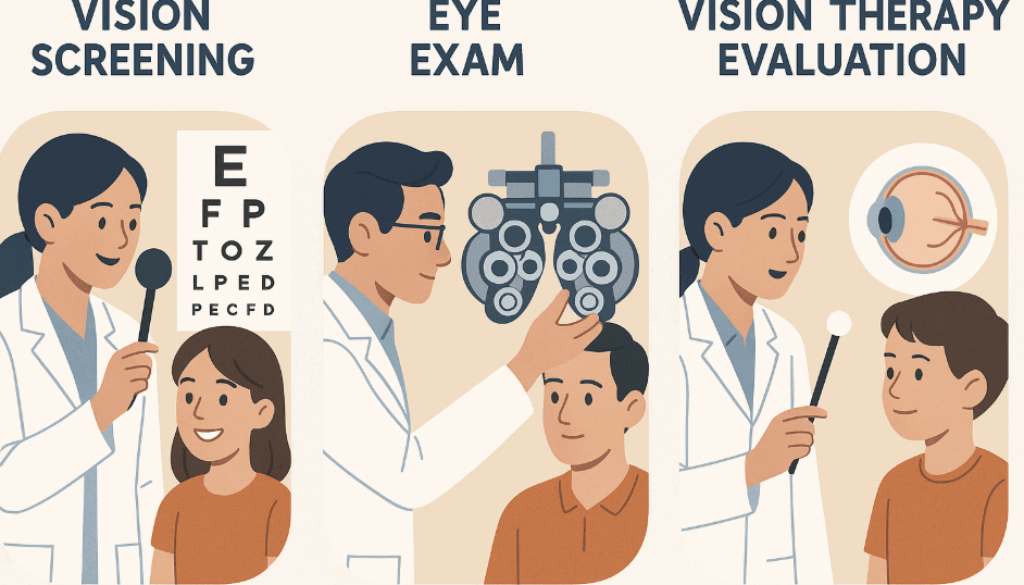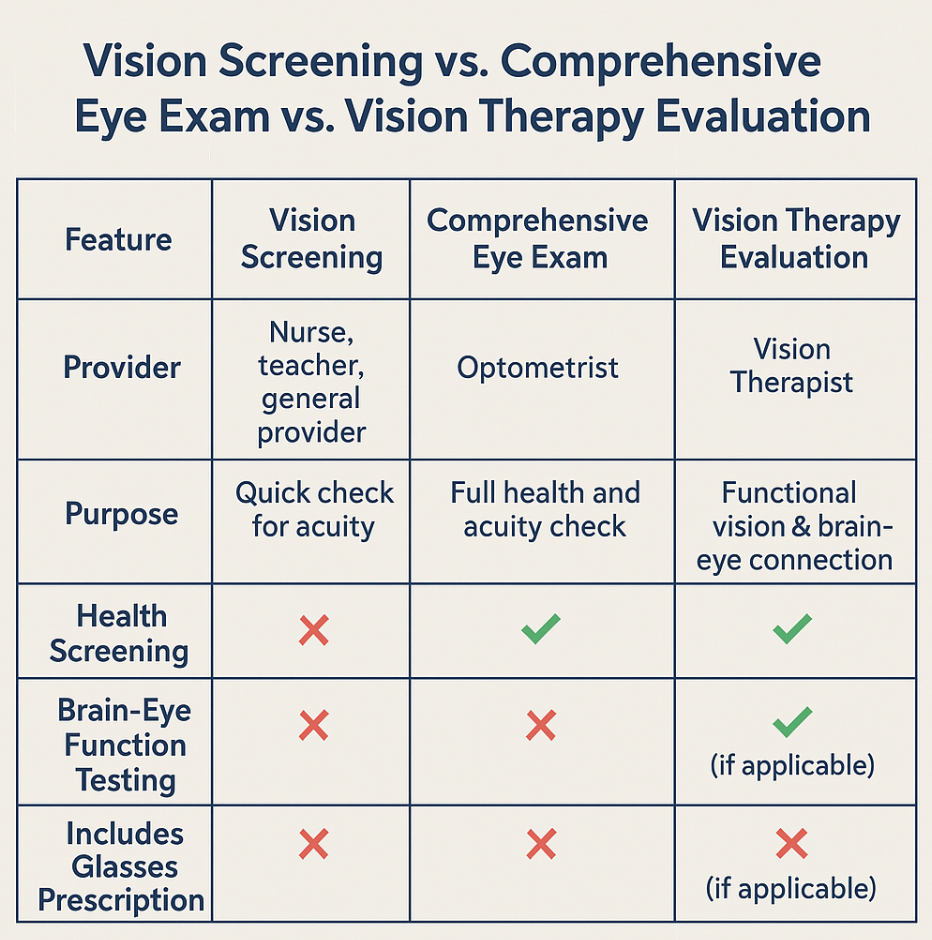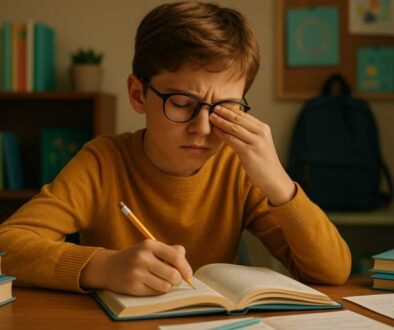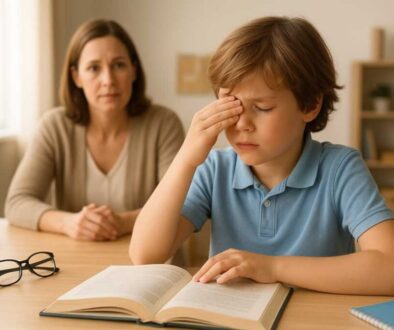Screening and Eye Exam vs. Vision Therapy Evaluation: What’s the Difference?

Discover how Vision Therapy Evaluations go beyond diagnosis to strengthen visual skills and eye-brain connection.
When it comes to protecting your vision and eye health, not all exams are created equal. Many people confuse a vision screening with a comprehensive eye exam—or assume that either one is enough. However, understanding the difference is crucial for maintaining optimal eye health and performance. And beyond these two, there’s a third option: a vision therapy evaluation. At Cook Vision Therapy, we specialize in helping your eyes and brain work better together—something traditional exams don’t cover.
What Is a Vision Screening?
A vision screening is a brief and basic test designed to identify potential vision problems. Most commonly performed in schools or at general health appointments, vision screenings are useful for identifying individuals who may have vision problems, such as nearsightedness or difficulty reading an eye chart. These screenings are often conducted by school nurses or general healthcare providers—not by an optometrist.
A vision screening is a simple way to check for clear sight at various distances, but it only measures visual acuity. It does not assess eye health, pupil function, or how the eyes work together. Passing a vision screening means you can read a chart—it doesn’t mean your vision system is working at full capacity.
What Is a Comprehensive Eye Exam?
A comprehensive eye exam is a detailed evaluation of your eye health and visual clarity. Performed by an optometrist, this exam includes tests for:
- Visual acuity
- Refractive errors (for glasses or contact lenses)
- Eye alignment
- Pupil reaction
- Internal and external eye structure
- Eye pressure (to screen for glaucoma)
- Early detection of eye diseases like macular degeneration or diabetic retinopathy
Comprehensive eye exams are essential for diagnosing many eye conditions and preventing vision loss. They are especially important if you have a family history of eye disease or are experiencing noticeable changes in vision.
But even a comprehensive eye exam has limits. It doesn’t evaluate how well your eyes and brain communicate to process visual information. That’s where Cook Vision Therapy comes in.
What Is a Vision Therapy Evaluation?
Unlike a vision screening or a comprehensive eye exam, a vision therapy evaluation focuses on how your eyes and brain work together—not just whether you can see clearly or if your eyes are healthy. At Cook Vision Therapy, we specialize in treating functional vision problems that affect reading, learning, coordination, and attention.
Our evaluation includes:
-
A check of your current visual acuity (especially if you wear glasses)
-
Testing for binocular vision (can your eyes team up effectively?)
-
Eye tracking (can your eyes move smoothly across a line of text?)
-
Accommodation (can your eyes shift focus from near to far and back?)
-
Depth perception and visual processing
These are not tests for eye disease or structural eye health—those are handled by your optometrist. Instead, our goal is to uncover vision-based learning and performance issues that traditional exams miss. If you’ve had a comprehensive eye exam and everything came back “normal,” but you or your child still struggles with reading, attention, or visual fatigue, a vision therapy evaluation may provide the answers.
How Vision Therapy Trains Your Eyes and Brain
Vision therapy is not glasses. It’s not surgery. It’s a customized program that uses specialized activities and tools to train the brain and eyes to work together more efficiently.
Think of it like physical therapy for your visual system. Under the supervision of a trained vision therapist, patients learn how to:
-
Improve eye coordination
-
Strengthen focusing ability
-
Enhance tracking skills
-
Boost visual memory and processing
This kind of therapy is ideal for addressing vision problems related to eye teaming, convergence insufficiency, amblyopia (lazy eye), and more. It’s also helpful for athletes, individuals recovering from concussions, and students who struggle with reading or classroom performance.

Eye Exams and Vision Screening: Why Both May Not Be Enough
While eye exams and vision screening help catch many vision problems, they often miss the root causes of reading fatigue, poor hand-eye coordination, or visual attention difficulties. These issues lie in the way your brain processes visual input, and that’s where vision therapy makes a difference.
Vision screenings can help identify basic issues, and comprehensive eye exams are essential for diagnosing and managing serious eye conditions. But if everything looks “fine” and there are still concerns, consider the next step: a vision therapy evaluation.
Schedule a Vision Therapy Evaluation with Cook Vision Therapy
At Cook Vision Therapy, we focus on improving vision and overall eye health through specialized brain-eye training. We do not replace your optometrist or conduct detailed eye health checks—but we work alongside them to help you or your child achieve healthy vision that supports reading, learning, and daily life.
If you’ve had a comprehensive eye exam but still notice vision problems, schedule a vision therapy evaluation today. We’re here to uncover the hidden challenges traditional eye exams and vision screening might miss—and to help you train your way to better vision.
Maintaining good eye health starts with understanding what each exam offers. Know your options. Know your vision. And get the right help for the right problem.

Please note: None of the above should be considered medical advice. If you’re having any concerns about your vision, please reach out to us immediately or see your primary care provider.


